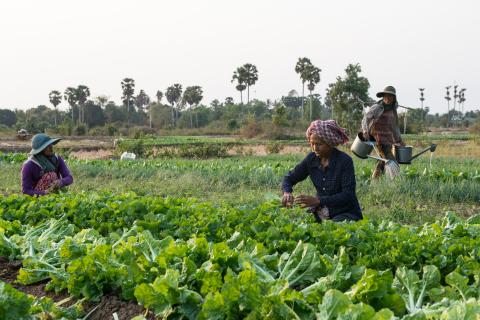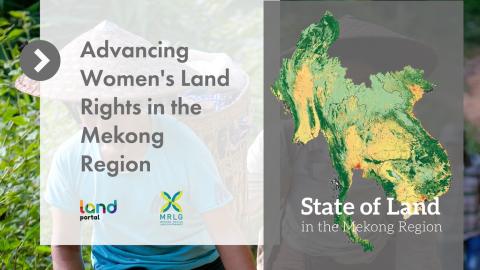Discover hidden stories and unheard voices on land governance issues from around the world. This is where the Land Portal community shares activities, experiences, challenges and successes.
 Follow our
Follow our
Sustainable Development Goals
Blog Series!
Interested in land corruption?
Follow our Land & Corruption Blog Series
for in-depth perspectives from the experts.
Issues
Geographical focus
On January 23, 2025, the Land Portal Foundation and Mekong Region Land Governance (MRLG) convened a webinar to explore the evolving landscape of agricultural investments in the Mekong region. Experts from various sectors joined to discuss the impact of industrial crops, smallholder farmer integration into transnational value chains, and the resulting economic, environmental, and social transformations.
The webinar “Pathways to Customary Land & Forest Rights in the Mekong” took place on July 2nd, 2024. This was the second webinar in the series ‘State of Land in the Mekong region’ which aims to highlight the evolving environment of land governance in this dynamic region, including Cambodia, Lao PDR, Myanmar and Vietnam. The webinar attracted 240 participants and featured experts from the Mekong region.
A Recap of the Recent Land Portal-MRLG Webinar on Gender Equitable Land Governance in the Mekong Region
On Thursday 15 February, the Mekong Region Land Governance (MRLG) project and the Land Portal launched the first webinar in the State of Land in the Mekong series. The series, which will consist of three webinars across 2024 and 2025, aims to shine a spotlight on land issues in the Mekong region during a time of immense rural transformation.
This webinar took place on February 15th, 2024, under the title “Women’s Participation in Land Governance in the Mekong : Moving Beyond Quotas to Meaningful Inputs and Influence”. The webinar featured panelists from researchers to youth representatives and was jointly organized by the Land Portal Foundation and Mekong Region Land Governance (MRLG).
Sr. Elizabeth Daley, Independent freelance consultant and Chair of the Land Portal Foundation, moderated the panel, which featured the following speakers:
Maize is a key global cash crop, produced in every continent except Antarctica. As a flex crop, it has multiple uses including for direct human consumption, as an ingredient for animal feed, as a key component in processed foods, or in ethanol production. According to figures from FAOSTAT, global production increased from 0.2 to 1.2 billion tons between 1961 and 2020.
Curating land information is part of our daily work in the Land Portal. It includes selecting, categorizing, and enriching information with analysis and/or additional data, graphic visualizations, etc. In times with so much information available to choose from, people are increasingly seeking sources that offer selections of high-quality knowledge and provide analysis that make sense of it. Understanding how partners in the land community are meeting this demand is a great source for us to improve our work of curating, and providing meaning to land data.
In some closing words to the Forum, Vicky Tauli-Corpuz (UN Special Rapporteur on the Rights of Indigenous Peoples, United Nations) applauded the attention given to customary land tenure. For communities there has always been a struggle for their practices to be acknowledged, despite the fact that these existed long before the arrival of state governments. She found much promise in some of the legal work taking place in the Mekong region.
The second day of the Forum built upon discussions around customary land tenure in the Mekong region, but with a focus upon private sector investment practices, particularly concerning agriculture and the potential impact on smallholder farmers, the rural poor, and the environment.
The third session of the Forum explored the nature of FPIC (Free, Prior and Informed Consent) and how it fits into the Mekong landscape, using case studies from a Vietnamese coffee project, and a company seeking land for eucalyptus plantations in Lao PDR.
Presentation 1
The first session of the 3rd Mekong Regional Land Forum looked to clarify an understanding of customary land tenure systems, and bring a focus upon communities living in and around forestland areas of the Mekong region. The session observed some of the policy developments that could lead to greater recognition of customary tenure and land security for community members.
Summaries and selected replays from the 3rd Mekong Regional Land Forum are available below. Full replays of the plenary sessions will be posted shortly -- check back soon!
The second session of the 3rd Mekong Regional Land Forum explored some of the regional and global trends in protecting local user rights in forests. In particular, it looked at some of the regional programs in social forestry and how these attempt to draw a balance between community needs and other demands for conservation, and exploitation for timber and non-timber resources.





